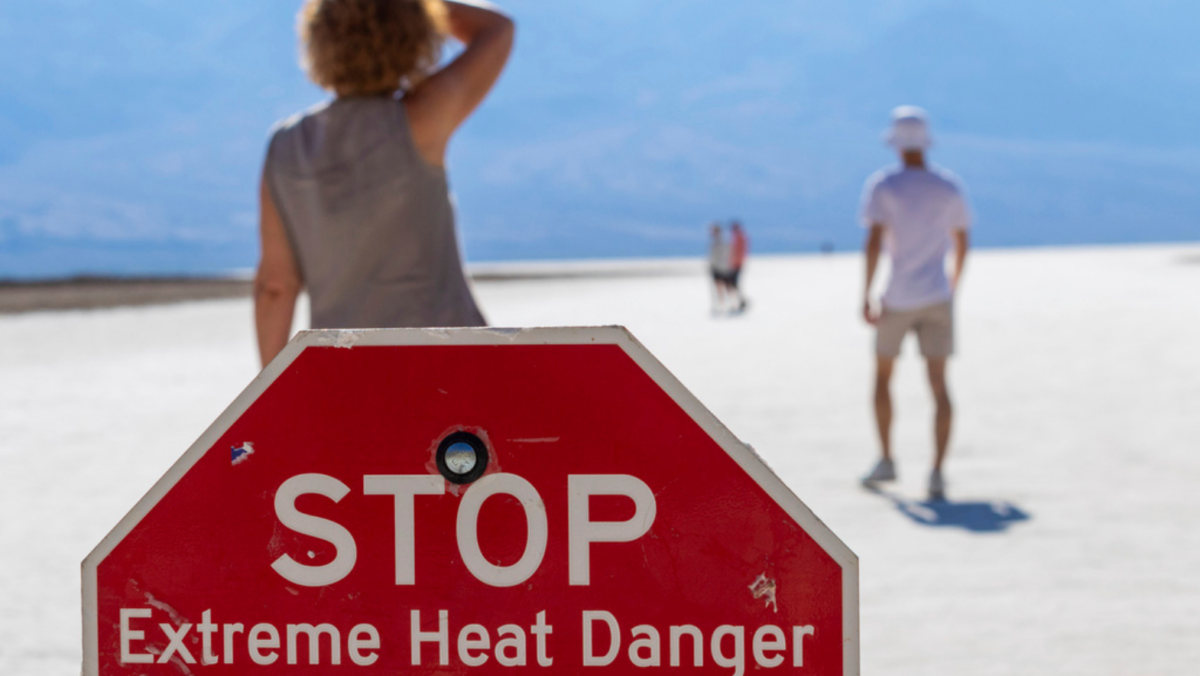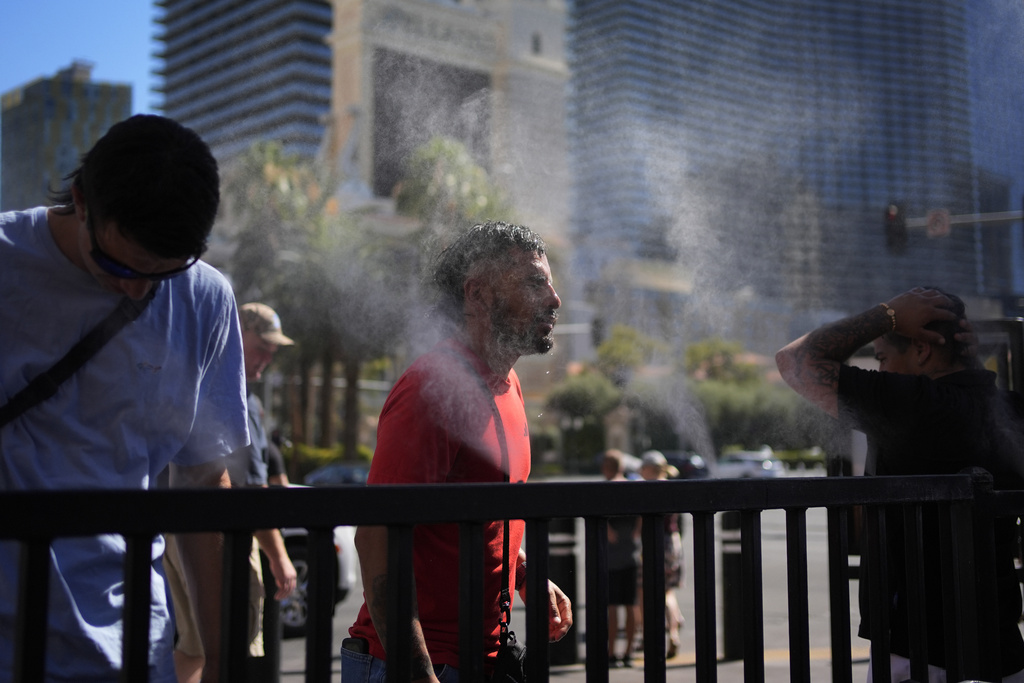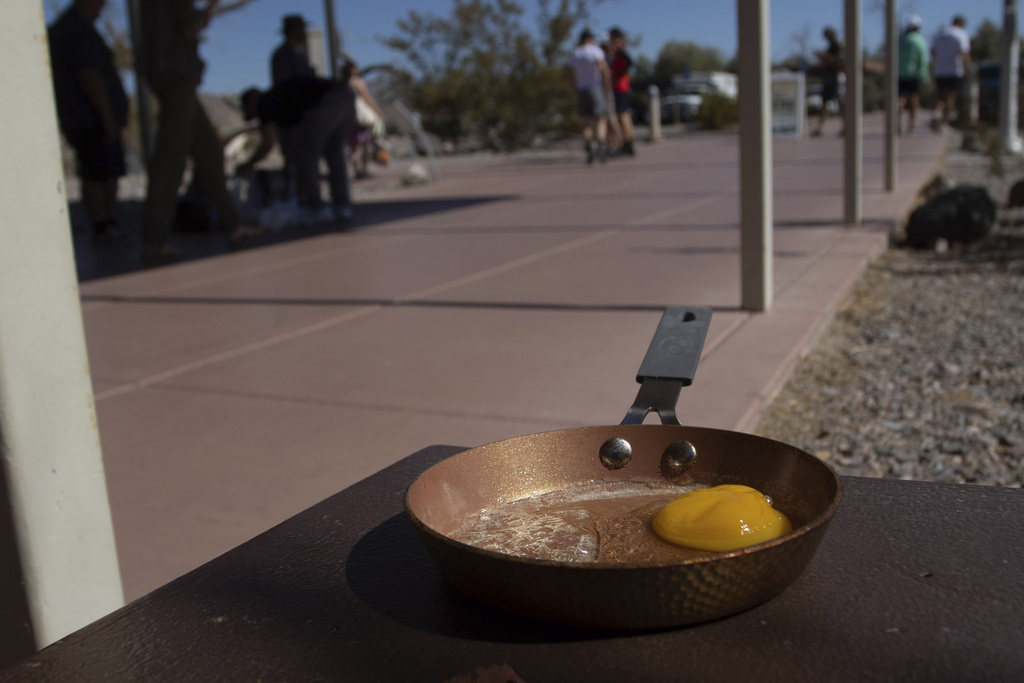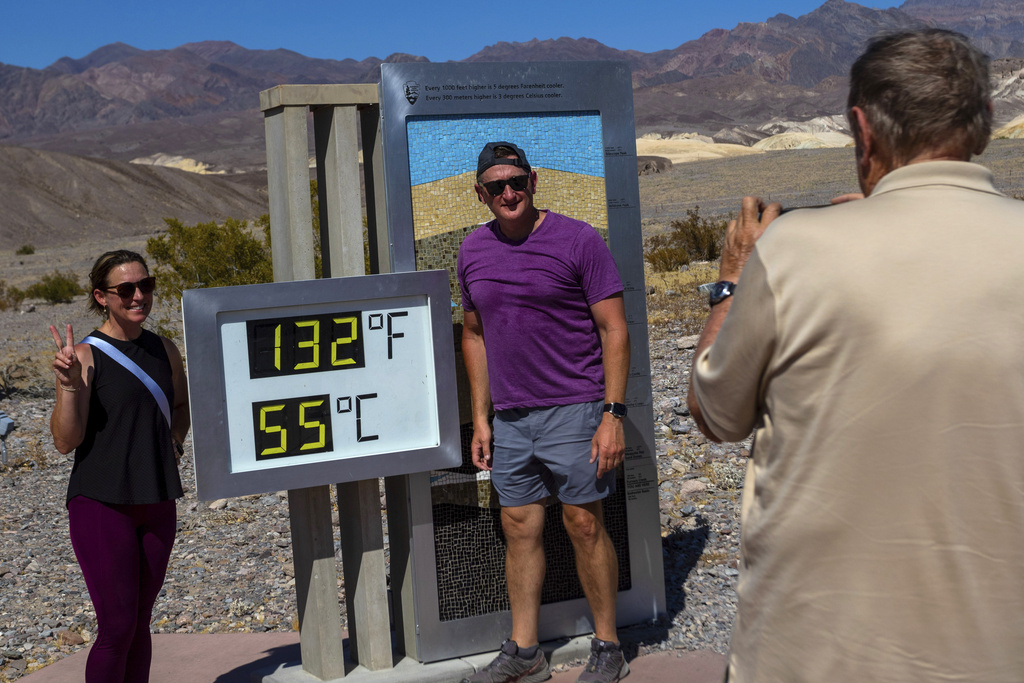Heat wave grills large parts of the US causing deaths in the West

A person wipes sweat from their brow at Badwater Basin in Death Valley National Park, Calif., Sunday, July 7, 2024. Forecasters say a heat wave could break previous records across the U.S., including in Death Valley. (AP Photo/Ty ONeil)
After causing deaths and shattering records in the West over the weekend, a long-running heat wave will again grip the U.S. on Monday, with triple digit temperatures predicted for large parts of the East Coast.
The dangerous temperatures caused the death of a motorcyclist in Death Valley.
The U.S. heat wave came as the global temperature in June was record warm for the 13th straight month and it marked the 12th straight month that the world was 1.5 degrees Celsius (2.7 degrees Fahrenheit) warmer than pre-industrial times, the European climate service Copernicus said in an early Monday announcement.
An excessive heat warning, the National Weather Service’s highest alert, was in effect for about 36 million people, or about 10% of the population, weather service meteorologist Bryan Jackson said. Dozens of locations in the West and Pacific Northwest tied or broke previous heat records.

People cool off in misters along the Las Vegas Strip, Sunday, July 7, 2024, in Las Vegas. A heat wave is spreading across the Western U.S., the National Weather Service said, sending many residents in search of a cool haven from the dangerously high temperatures. (AP Photo/John Locher)
A high temperature of 128 F (53.3 C) was recorded Saturday and Sunday at Death Valley National Park in eastern California, where a visitor died Saturday from heat exposure and another person was hospitalized, officials said.
The two visitors were part of a group of six motorcyclists riding through the Badwater Basin area amid scorching weather, the park said in a statement.
The person who died was not identified. The other motorcyclist was transported to a Las Vegas hospital for “severe heat illness,” the statement said. Due to the high temperatures, emergency medical helicopters were unable to respond, as the aircraft cannot generally fly safely over 120 F (48.8 C), officials said.
The other four members of the party were treated at the scene.
“While this is a very exciting time to experience potential world record setting temperatures in Death Valley, we encourage visitors to choose their activities carefully, avoiding prolonged periods of time outside of an air-conditioned vehicle or building when temperatures are this high,” park Superintendent Mike Reynolds said.

An egg lays in a small frying pan at the Furnace Creek Visitors Center in Death Valley National Park, Calif., Sunday, July 7, 2024. Forecasters say a heat wave could break previous records across the U.S., including in Death Valley. (AP Photo/Ty ONeil)
Officials warned that heat illness and injury are cumulative and can build over the course of a day or days.
“Besides not being able to cool down while riding due to high ambient air temperatures, experiencing Death Valley by motorcycle when it is this hot is further challenged by the necessary heavy safety gear worn to reduce injuries during an accident,” the park statement said.
Across the desert in Nevada, Las Vegas on Sunday set a record high of 120 F (48.8 C).
Triple-digit temperatures were common across Oregon, where several records were toppled, including in Salem, where on Sunday it hit 103 F (39.4 C), topping the 99 F (37.2 C) mark set in 1960. On the more-humid East Coast, temperatures above 100 degrees were widespread, though no excessive heat advisories were in effect for Sunday.
“Drink plenty of fluids, stay in an air-conditioned room, stay out of the sun, and check up on relatives and neighbors,” read a weather service advisory for the Baltimore area. “Young children and pets should never be left unattended in vehicles under any circumstances.”
Heat records shattered across the Southwest

Melissa Bolding and Bryan Bolding from Oklahoma City pose for a photo next to a thermometer displaying a temperature of 132 degrees Fahrenheit / 55 degrees Celsius at the Furnace Creek Visitors Center, in Death Valley National Park, Calif., Sunday, July 7, 2024. Forecasters said a heat wave could break previous records across the U.S., including at Death Valley. (AP Photo/Ty ONeil)
Rare heat advisories were extended even into higher elevations including around Lake Tahoe, on the border of California and Nevada, with the weather service in Reno, Nevada, warning of “major heat risk impacts, even in the mountains.”
“How hot are we talking? Well, high temperatures across (western Nevada and northeastern California) won’t get below 100 degrees (37.8 C) until next weekend,” the service posted online. “And unfortunately, there won’t be much relief overnight either.”
More extreme highs are in the near forecast, including possibly 130 F (54.4 C) around midweek at Furnace Creek, California, in Death Valley. The hottest temperature ever officially recorded on Earth was 134 F (56.67 C) in July 1913 in Death Valley, though some experts dispute that measurement and say the real record was 130 F (54.4 C), recorded there in July 2021.

